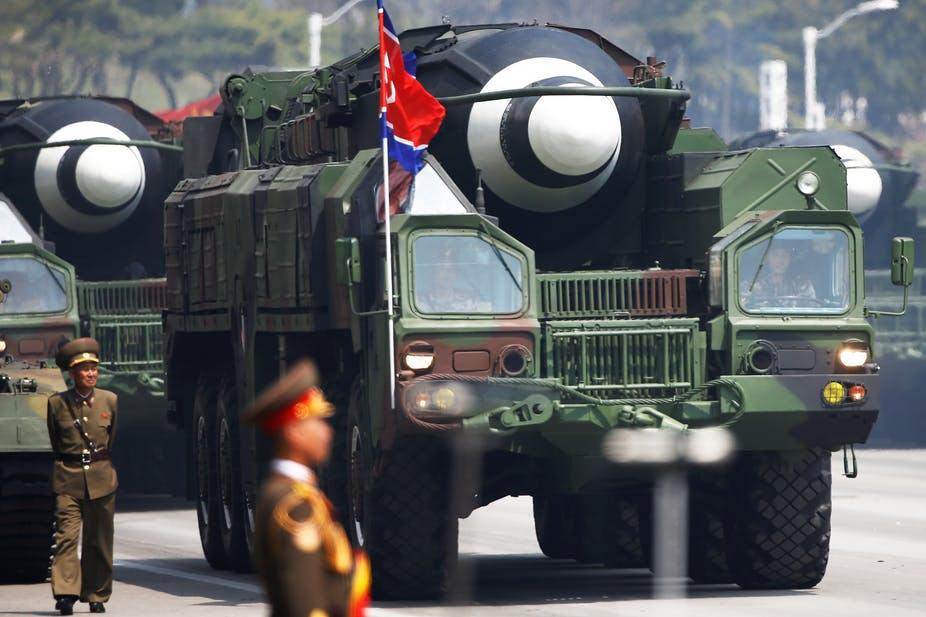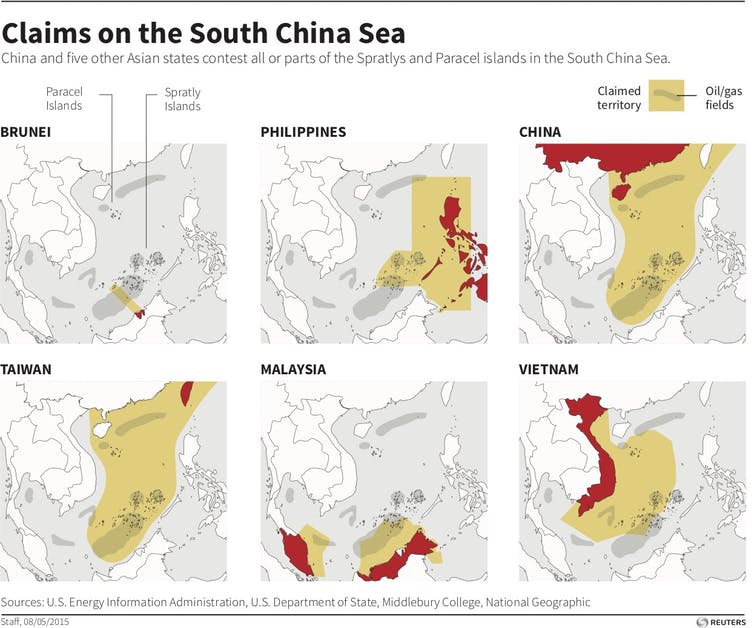
According to latest polls, a majority of Americans see North Korea as the greatest immediate threat to the U.S. with as many as 73 percent concerned about Kim Jung Un’s use of nuclear weapons. The world lives in fear that one more provocation in the form of a North Korean missile or nuclear test could lead to major war on the Korean Peninsula.
It is true that tensions have lessened recently with North and South Korea holding talks and, on March 8, President Trump accepting an invitation to meet with North Korean leader Kim Jung-Un “by May.”
But past efforts to engage the North have often left participants unsatisfied and disappointed. If these talks fail or lead to frustration, the temptation to resort to military force could ratchet up quickly. And if such direct engagement efforts fall short of expectations, international arbitration might provide – as it has in the past – an alternative to conflict.
As scholars who study international law and Asian politics, our question is: Could arbitration help resolve the present crisis with North Korea?
We have been here before
In 1904, war between Russia and the United Kingdom appeared imminent after the Russian Baltic fleet fired on and severely damaged six English fishing boats, killing two fisherman and wounding six others, on Dogger Bank, just a few miles off the coast of England.
The British press demanded that the “wretched Baltic fleet” be destroyed, and the Royal Navy eagerly maneuvered to do just that.
War was avoided at the last minute when the foreign ministers of both countries agreed to arbitration presided over by commissioners from Britain, Russia, the United States, France and Austria.
The result was a four-month interval that allowed time for tempers to cool as well as a complete inquiry and an analysis of the incident.
Ultimately Russia paid damages for the incident on Dogger Bank, and the U.K. and Russian governments were both able to step away from war while saving face with their public.
A positive track record
The United States, too, has been party to disputes settled by arbitration.
The most prominent of these are the “Alabama claims” in which the U.S. – after the Civil War – demanded reparations from the U.K. for having supplied and armed Confederate ships such as the CSS Alabama, despite being ostensibly neutral. These “Confederate raiders” had caused millions in damages to American shipping. Such was the tension between the two countries that some American politicians suggested that the U.S. annex Canada, which was then under British rule.
Instead, diplomacy prevailed and the U.S. and the U.K. finally agreed in 1871 to an arbitration panel – composed of Switzerland, Italy, Brazil, U.S. and the U.K. – that awarded US$15 million to Washington and, critically, also set the stage for a lasting peace between the two countries.
After this arbitration, politicians, including Ulysses S. Grant, thought the world could be entering an “epoch when a court recognized by all nations will settle international differences” so as to avoid major military conflict.
Indeed, such a court was created in 1899 at the Convention on Pacific Settlement of International Disputes and still exists with the Permanent Court of Arbitration in The Hague, which has been actively involved in settling current disputes in India, Malta, Italy, Timor, Australia and South Africa.
Given this positive historical track record, could arbitration help avoid war on the Korean Peninsula today?

Why it could work
This is not far-fetched.
It is impossible to underestimate the enmity between Russia and the U.K. in 1904 or England and the U.S. in the mid-19th century, but arbitration still took place. All three of these countries were also extremely nationalistic in an age of great power expansion. Their concept of individual sovereignty was not unlike that which kept the U.S. in the 20th century from signing on to international conventions such as the U.N. Law of the Sea and the International Criminal Court.
What it took to get to arbitration, in the case of Dogger Bank, was a third party like France concerned about being dragged into a larger conflict – think China today – and individual government officials who were willing to honestly seek peace.
So, assuming that there would be willingness on the American and Korean sides to this, how might it work?
How it could work
One advantage of such a commission is that it could make relatively objective, logical and practical decisions that politicians could never agree to if they wanted to keep their popular base and their defense establishments happy.
For example, it is likely that President Donald Trump could not, at present, agree to let North Korea keep nuclear weapons. At the same time, despite what Kim Jong Un has told the South Koreans, his generals would probably not be happy with a unilateral promise to cease testing in the Pacific.
Supporting an international arbitration mechanism would certainly offer China a tempting opportunity to restore its international legal image following its rejection of the 2016 U.N. ruling against it and its claims in the South China Sea.
###
This story by



